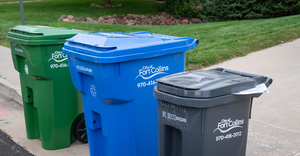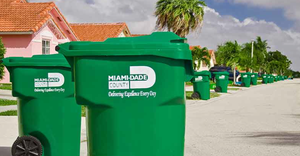New York City Council Passes Controversial Waste Bill (Updated)
Advocates say Intro 157 will help “overburdened” communities, but critics say this bill will raise costs and kill jobs.
On August 16, New York City Mayor Bill de Blasio signed into law Intro 157 legislation, better known as the waste equity bill, which would reduce the permitted capacity of waste transfer and recycling processing facilities in selected areas of the city.
While advocates of the bill maintain this will help overburdened communities, other groups are calling it “an unfortunate, unwarranted and unproductive attack on the city’s essential waste management infrastructure.”
In a joint statement released by the National Waste & Recycling Association's (NWRA) New York City Chapter and New Yorkers for Responsible Waste Management, the groups say when the law is implemented next year, it will provide little in the way of actual relief to the targeted areas.
“By restricting the use of existing permitted capacity, the law will increase costs to the city’s businesses, result in the loss of good working-class jobs, cause the displacement of dozens of waste collection trucks to other neighborhoods and diminish the city’s ability to deal with future crises like Superstorm Sandy that could imperil the city’s new waste export facilities,” according to the statement.
The groups also noted that the city’s waste management companies fully intend to challenge Intro 157 in court on a variety of grounds, including the city’s failure to properly conduct an environmental impact review and formally modify its state-approved Comprehensive Solid Waste Management Plan.
“Throughout consideration of the transfer station capacity reduction issue over the years, the NYC NWRA Chapter has consistently told the council, the mayor and the public that the city has failed in its legal obligation to conduct a full environmental impact study of the issues in Intro 157-C,” said Steve Changaris, NYC Chapter director, in a statement. “Accordingly, we will have no other recourse now but to take up our concerns in the courts.”
The long-awaited—and often times contentious—bill that would cap the amount of waste handled by three New York City communities passed by a City Council vote of 32-13 in July.
The Intro 157 legislation, known as the “waste equity bill,” targets North Brooklyn, South Bronx and Southeast Queens—home to 26 of the city’s 38 waste transfer stations.
Supporters of the legislation, including Council Member Antonio Reynoso, lead sponsor of the bill, Teamsters Local 813 and other advocacy organizations, say low-income communities of color have been “overburdened” and currently handle a staggeringly disproportionate amount of the city’s waste.
Sean Campbell, president of Teamsters Local 813, tells Waste360 that though he supports the bill, he doesn’t think the current legislation goes quite far enough.
“But I’m happy that something is being done because there are three different neighborhoods that the majority of waste goes to, and I definitely think it’s unfair,” he explains. “I think that everybody in every single neighborhood creates waste, and I think it should be distributed a little more evenly.”
Campbell says this legislation would in effect “keep things in check” and put a cap on the waste that is brought into these particular neighborhoods.
Advocates of the bill maintain the residents in these districts are exposed to dangerous truck traffic, elevated air pollution and hazardous environmental impacts. They also say that under the current system, these overburdened communities have the permitted capacity to accept even more trash than they already do.
However, opponents of the bill don’t see it that way.
According to a Crain's New York article, critics argue this legislation will raise costs, kill jobs and damage the infrastructure necessary to keep the city clean. They also say it is not clear how the reductions will be implemented and where the waste will be diverted.
Crain’s also reports that critics say they were never given the chance to review the 144-page environmental assessment that the New York City Department of Sanitation (DSNY) handed out just before a hearing on the bill before the Sanitation and Solid Waste Management Committee.
The New York Post called the City Council’s move a “misguided rush to trash garbage collection” in an op-ed. According to the Post, the “Bloomberg administration instituted a plan to distribute the waste fairly a decade ago.”
The editorial stresses that the groups representing the private carting industry and businesses are concerned about the impact of this bill. Concerns include: “Facilities losing income and possibly closing; the loss of jobs; higher fees businesses will have to pay for private trash pickup; and even more truck traffic,” according the editorial.
“The lower cap would also add turmoil to an industry that already fears a sanitation plan to create zones and limit competition in each of them to a select few carters,” the Post emphasizes.
Since the idea of waste equity was introduced in the city’s Solid Waste Management Plan a decade ago, community activists across the city have been fighting for the passage of this bill, and the Progressive Caucus of the New York City Council has advocated for this legislation through its legislative agenda for two consecutive terms.
Addressing opponents’ concerns, advocates of the bill, like Campbell, don’t see how this legislation would impact jobs.
“The problem that I see with a lot of these issues is people only care about, ‘How much money is going into my pockets? Do I care about my fellow man? No,’” Campbell stresses. “But we want to disguise it and say, ‘oh well, this thing is going to kill jobs,’ and it’s the furthest thing from the truth.”
“I am someone who worked in the waste industry, and I wasn’t always a union officer,” he adds. “I am somebody who worked in the transfer station and who drove a garbage truck, so these issues are real to me. I’m a union official; I don’t want to see one person lose a job.”
This summer, DSNY is expected to release its plan for zoned collection of commercial waste, which will enact further reforms that address inefficient routes, worker abuse and low recycling rates.
“The passage of Intro 157 is a momentous achievement in the fight for environmental justice and the reform of our city’s private waste management system,” says Reynoso. “Currently, low-income communities of color handle a staggeringly disproportionate amount of our city’s waste … Intro 157 will finally deliver environmental justice to frontline communities and ensure that no other neighborhood suffers the same fate, while setting a historic precedent for the fair share distribution of burdensome and polluting facilities in the city of New York. This is a first, crucial step toward reforming the city’s commercial carting industry.”
About the Author
You May Also Like




